Latest News
Iran pays Afghans to fight in Syria, Iraq, Yemen
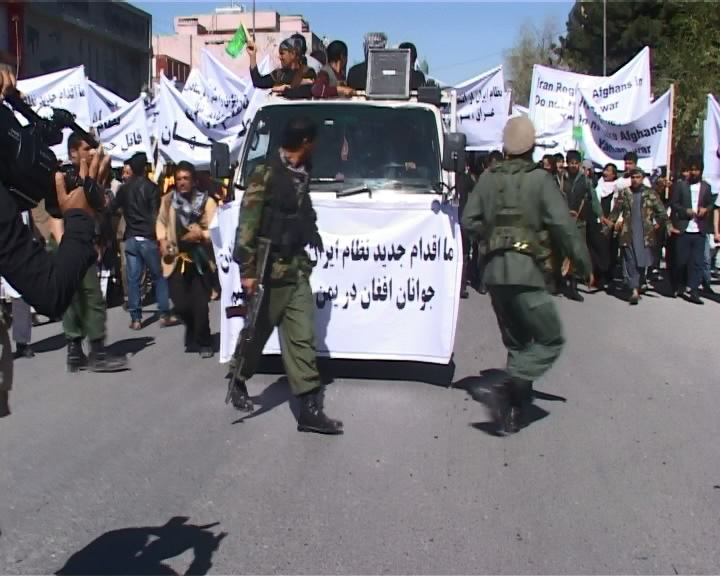
Iran pays Afghan refugees to present in Syria, Iraq and Yemen wars, head of Mushrekat-e Mili party said.
Najibullah Kabuli, head of Musharekat-e Mili party said that Iran has been recruiting “thousands” of Afghan refugees to fight in Syria, Iraq and Yemen offering 500 dollars a month.
Members of Musharekat-e Mili in a demonstration in Kabul called Afghan government and the United Nations to stop Iran not to persuade Afghans present in Arabic wars.
Musharekat-e Mili party warned that if national unity government officials does not pay serious attention regarding the issue they will wildly protest.
Iran’s role differs in Iraq, where it bolsters Shiite Muslim militias, versus Syria, where it reportedly supports Lebanese Hezbollah fighters. In Yemen, Iranian agents are reportedly trying to help overthrow the American-backed Sunni government, and such efforts are taking place against the backdrop of ongoing international negotiations regarding Iran’s nuclear program.
There have been a few reports to that effect in the international news media over the past months, detailing recruitment efforts mainly by the Iranian government among Hazaras in order to bolster the Assad regime’s manpower. However, there has never been evidence of Afghan fighters actually present in Syria – until now.
On 22 May, the Wall Street Journal published a report about Iranian efforts to recruit Shiite Afghans to fight for the regime of Bashar al-Assad in Syria.
It thus seems probable that Shiite Afghans are also approached for recruitment to fight in Syria. The Wall Street Journal report offered details of the recruitment policy, but gave no evidence of Afghan fighters actually present in Syria. There is also no information on the overall number of Afghan fighters in Syria from any side nor any official announcements about their presence from the government in Damascus. According to sources within the Syrian regime, its intention is to keep the presence of Afghan fighters a secret. This might be because the impression is increasingly gaining ground that the Syrian army is depending on foreign forces and would loose the war without their help.
There have been, however, approximately 2,000 mostly Hazara Afghan refugees living illegally (that is, without Syrian papers) in Syria since the fighting broke out in 2011, many of them stranded on their way to Turkey and Europe, most of them living in or around the capital Damascus and some seeking shelter near the Zainab shrine.
Reported by Nematullah Ahmadi

Latest News
Iranian official: Only vulnerable points of Afghanistan’s border will be walled and fenced
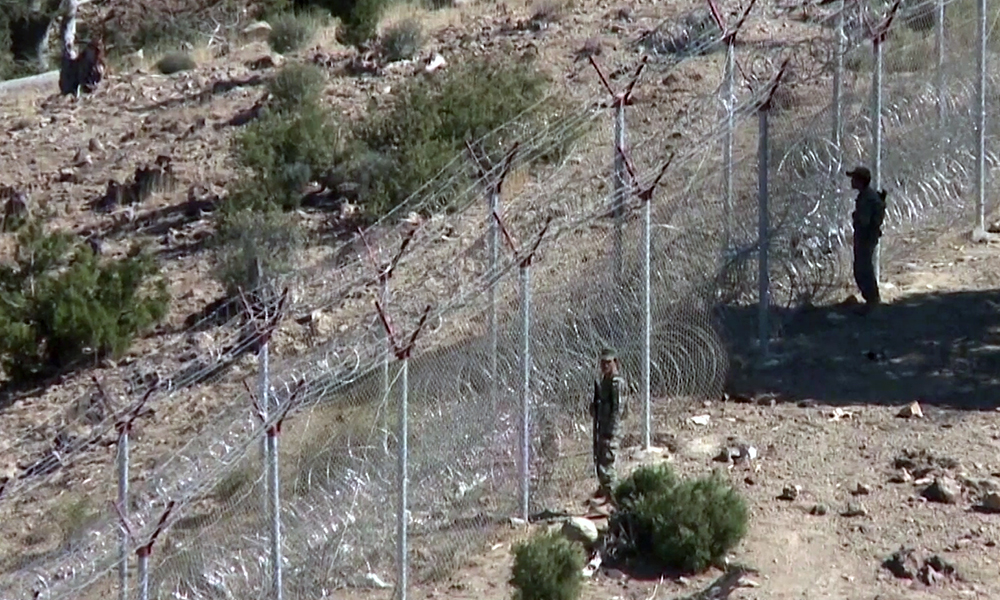
An Iranian security official has said that the entire border of Iran with Afghanistan will not be fenced, rather barriers will be created only at vulnerable points.
Iranian army has announced that the plan to create barriers at the border with a four-meter concrete wall, barbed wire and fence will be implemented within three years.
“In some northwestern and eastern borders, there are threats from the other side of the borders that we are countering,” said Qassem Rezaei, Iran’s deputy police commander.
He added that drug trafficking, human trafficking, and even terrorist infiltration may take place through these borders.
Meanwhile, the Minister of Interior of Iran Ahmad Vahidi has announced that over 1.3 million illegal foreign nationals have returned to their country in the past year.
He added that illegal citizens should leave Iran as they are not allowed to stay.
Latest News
Hanafi meets WHO regional director, stresses need for cooperation
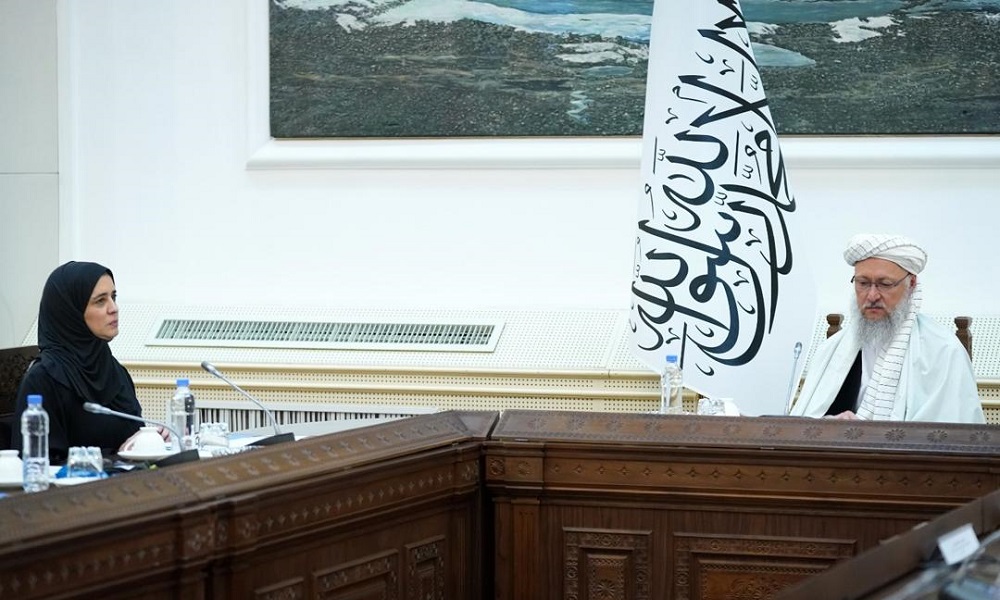
Deputy Prime Minister for Administrative Affairs Abdul Salam Hanafi on Sunday met with WHO Regional Director for the Eastern Mediterranean, Hanan Balkhy, and called for the organization’s cooperation including in the establishment of clinics in remote areas and training of specialists.
According to a statement released by his office, Hanafi pointed out that since the Islamic Emirate in Afghanistan regained power, there has been progress in various fields, including the fight against drug production and trafficking, the roundup and treatment of drug addicts, the eradication of corruption and nationwide security.
He asked the WHO to hand over Afghanistan’s seat to the representative of the Islamic Emirate and restore Afghanistan’s membership in meetings of the executive board and leadership meetings of the Mediterranean region.
Hanafi also called for the cooperation of international organizations in providing alternative livelihoods for poppy farmers and in providing assistance to flood victims.
While stressing that the eradication of polio is one of the priorities of the Islamic Emirate, Hanafi asked the WHO to activate polio diagnosis laboratories and supply vaccines, establish a cancer treatment center, prevent malnutrition among children and provide safe drinking water.
According to the statement, WHO official Balkhy said in the meeting that the health issue is non-political and one of the priorities of the organization.
She pointed to the achievements of the Islamic Emirate in various fields and expressed hope that better conditions will be provided for Afghans in the health and education sector.
Balkhy explained that WHO, together with other international organizations and the European Union, has a three-year project that includes the establishment of health centers in different provinces of Afghanistan.
She also expressed her appreciation for the efforts of the Islamic Emirate in the fight against polio and added that she will discuss the issue of providing alternative livelihoods for Afghan farmers with the WHO and other relevant organizations.
Latest News
OIC summit urges IEA to respect girls’ right to education
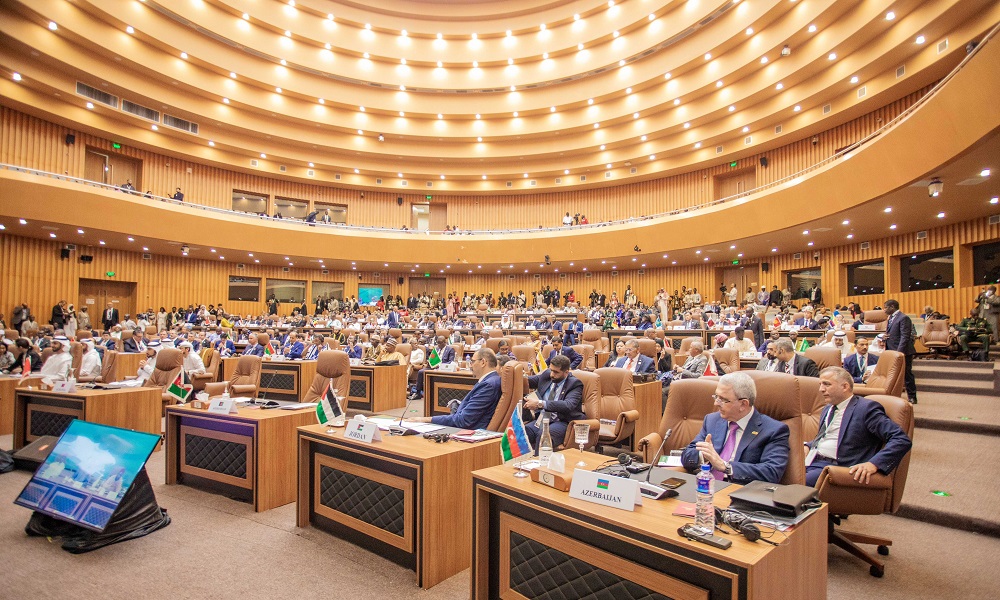
The 15th summit of the Organization of Islamic Cooperation (OIC) in Gambia on Sunday called on the Islamic Emirate of Afghanistan (IEA) to respect Afghan girls and women’s right to education and work.
In a declaration, OIC described the right to education and work as the fundamental rights of Afghan girls and women, and called for more communication with the IEA authorities on these issues.
Additionally, the participants emphasized the need for more efforts to address the challenges related to ethnic groups, drugs, terrorism, and social issues to ensure inclusive governance and sustainable peace and stability in Afghanistan.
“We also emphasize the need to make more efforts to address the challenges associated with ethnic groups, terrorism, drugs and social aspects for inclusive governance to achieve sustainable stability,” the declaration said.
Delegations from the 57 OIC member states attended the conference, organized by the Organization of Islamic Cooperation under the theme “Enhancing unity and solidarity through dialogue for sustainable development.”.
The summit was also attended by an IEA delegation.
-

 Sport4 days ago
Sport4 days agoSorkh Poshan Khafi and Khadim FC winners in their ACL matches
-
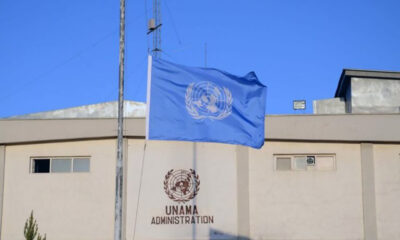
 Latest News4 days ago
Latest News4 days agoUNAMA issues latest rights report, notes ongoing challenges for women, girls and media
-
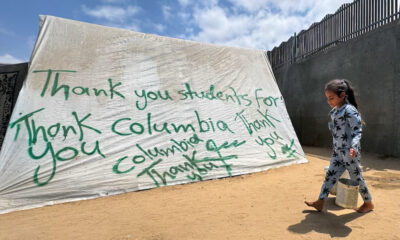
 World4 days ago
World4 days agoWhy Palestinians can count on American students but not Arab allies to protest
-

 Sport4 days ago
Sport4 days agoAbu Muslim and Attack Energy win in ACL matches
-

 Sport4 days ago
Sport4 days agoBairstow, Rossouw help Punjab beat Chennai in IPL
-

 Sport4 days ago
Sport4 days agoFour Afghans included in Refugee Olympic Team for Paris 2024
-
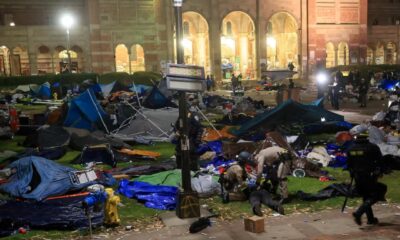
 World4 days ago
World4 days agoCalifornia police flatten pro-Palestinian camp at UCLA, arrest protesters
-

 Latest News4 days ago
Latest News4 days agoFive dead, 24 injured in traffic accident in Samangan

![DEMONISTRATION _08_04_2015_DARI_SOT.avi_snapshot_00.04_[2015.04.07_15.42.45]](http://ariananews.af/wp-content/uploads/2015/04/DEMONISTRATION-_08_04_2015_DARI_SOT.avi_snapshot_00.04_2015.04.07_15.42.451-300x240.jpg)














